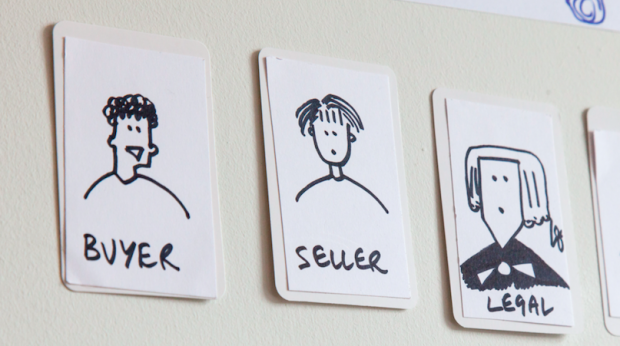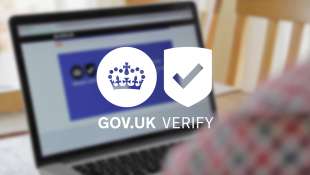In April this year we announced that a range of high quality certified companies had connected to GOV.UK Verify. In this guest blog post procurement expert David Kershaw shares his experience of the formal procurement process for these companies, and explains why the approach we took was revolutionary.

Meeting the Director of GOV.UK Verify and hearing about the programme towards the end of 2013, I knew immediately that I wanted to be part of it.
On the train home that evening I started to think about the complexities of the programme: third parties providing identity verification for citizens to transact with government from the comfort of their own home. This stuff isn’t easy. Then the penny-dropped. The procurement for GOV.UK Verify was going to be a nightmare. Where would I start?
Getting started
I arrived at GDS Towers with my suit and tie and PRINCE2 manual. I soon realised the tie had to go. The PRINCE2 manual had to be burnt.
Although GOV.UK Verify is one of government’s most complex programmes and the team were busy, the first thing I realised was that I wasn’t going to be placed in the corner and ignored because I was a boring procurement person. From Day 1 I was part of a multi-disciplinary team.
This was a new experience for me. The team of procurement, legal, and commercial experts was self-organising and it jointly owned the responsibilities and risks associated with the programme. But, more than that, each member was respected and everyone around me was enthused by this. For me there has never been a place where being part of a team was so powerful.
Team members were unafraid to ask questions: “Please could you tell us about procurement, the legal framework, the processes, the approvals?” and ““What would you like to know about the programme?”. Again, this was a new thing for me as a procurement person and I knew from that moment we would crack it. I had a client who was engaged in procurement and who wanted to share and learn equally.
Breaking with tradition to find new ways of working
After a period of time we had questioned many traditional procurement practices and asked “Why do we do it like that?”. Some answers we were happy to accept, such as “The law requires us to have a mandatory 10 day standstill period”. Other practices we challenged. We broke them down to the minimal viable products that were needed. This saved time, which saved money.
For example, instead of having a weekly 2 hour-long catch up like many government programmes, our team had short daily stand-ups. This was a government first for procurement. It enabled team members to know where each product was, if it was blocked, what was blocking it, and what else we could be working on. It not only encouraged active participation from all parties, it enabled us to deliver at pace.
We used a Kanban board for procurement. Again, a brand new idea in terms of buying in government. Traditional procurement would have seen the whole team work on a single spreadsheet with hundreds of cells to keep looking at. Instead, we broke these down to tasks that were either “to do”, “doing”, or “done”. This visibility showed progress and enhanced morale. In my view, planning like this enabled us to exploit the resources we had to had and deliver products earlier as many were being worked on weeks before they were needed.
Traditional procurement would see a sequential approach to product delivery when you have to wait for one thing to be delivered before you can start on the other.
The team working on procurement had a permanent slot at the fortnightly GOV.UK Verify showcase, allowing us to share progress. More importantly, this showed people from across GDS who was doing what and made us more approachable. The value of this was huge as procurement is so often seen as a blocker: being transparent reduced the risk of failure as we were constantly getting feedback from stakeholders.
Creating simpler, clearer contracts
For GOV.UK Verify we employed iterative development to create, test, learn and apply lessons to all procurement documentation, including the legal contracts with potential certified companies. This resulted in us removing unnecessary words, phrases and contractual clauses, whilst still maintaining contractual strength. Many of these were legacies hanging around in documents but not adding value (which also puts suppliers off). This is work that the GDS Digital Marketplace has continued, with better contracts leading to better government services.
A project of firsts
Having worked on 23 framework agreements and hundreds of OJEU’s, my experience with GOV.UK Verify was the best. The rules for buying in government are tricky and complex but the process is necessarily open, inclusive and transparent. The development of GOV.UK Verify has been open and transparent from the start and applying the same Agile principles to buying for the programme just made sense.
GOV.UK Verify led to many firsts for government procurement:
- removing traditional waterfall approaches and using Agile delivery methods
- carrying out thorough market engagement which meant we got the right thing (which didn’t need to be gold-plated) from a wide range of providers
- showing government and industry stakeholders the products and telling people about them which made the journey easier
- having a multi-disciplinary team
- using iterative documentation development
All this has helped us make buying in government better. It allowed us to create a strong relationship with the Crown Commercial Service and other departments and laid the foundations for transformational procurement.
We now know that government procurement works best when you:
- have a hierarchy-free multi-disciplinary team that jointly owns the delivery
- are open to change and are able to adapt
- ‘show the thing’ and keep the wider programme involved
- are willing to be bold and ask awkward questions that challenge the status quo
It was a pleasure working on GOV.UK Verify. Not only did we complete the procurement in a short space of time, our efforts really did change the way government buying works. We established new practices that others have since followed and built upon, starting the transformation of public procurement.
